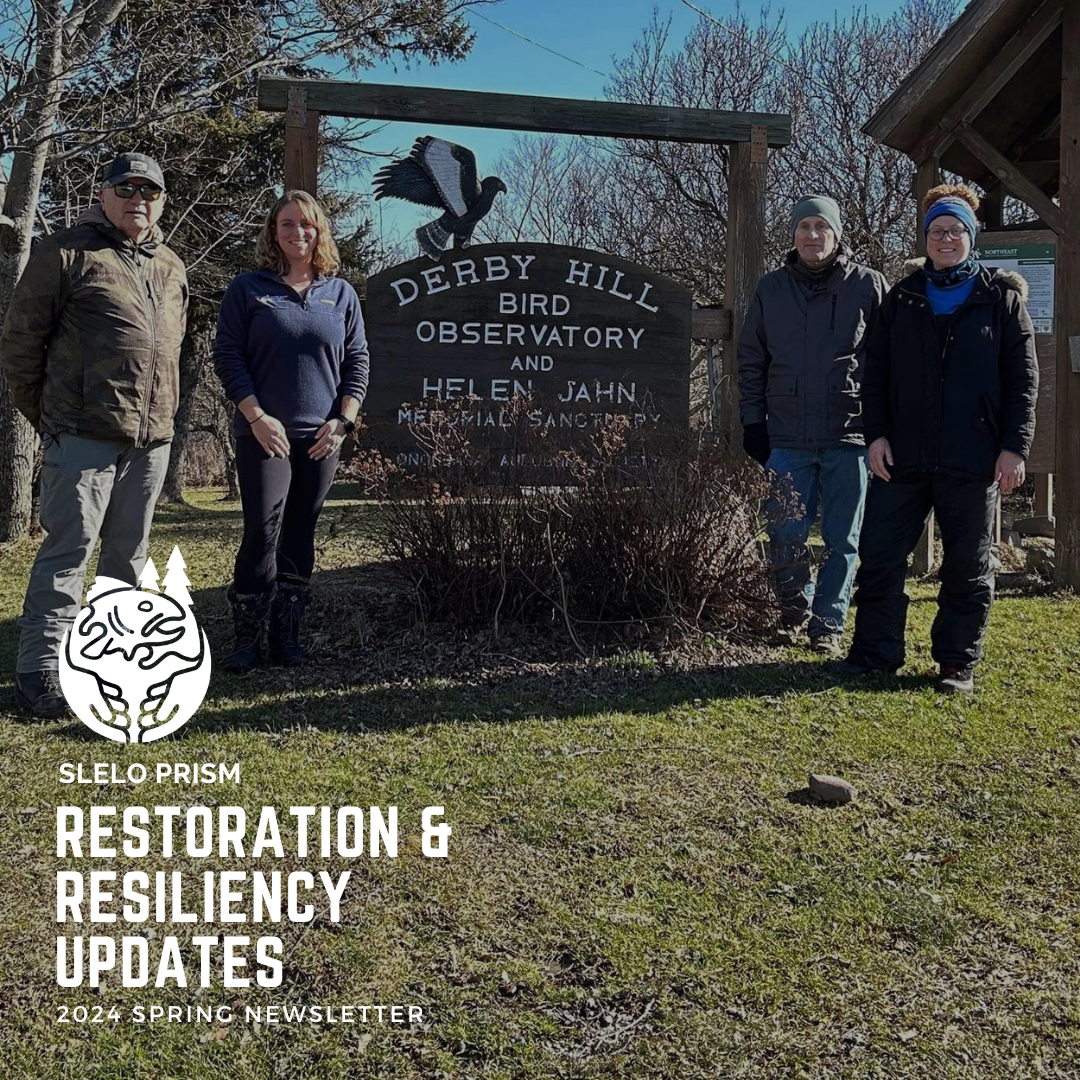This article was featured in the 2024 spring newsletter by Robert Smith-SLELO PRISM.
Hemlock Woolly Adelgid (HWA) Survey Results: This year, SLELO PRISM surveyed 18 sites for HWA. 13 of these were completed by the early detection team with some help from volunteers, while 5 were volunteer surveys led by Megan Pistolese-Shaw. Of these 18 sites, none were found to have HWA present. Also, no reports of HWA were reported by other organizations this year. The 7 known HWA Sites are as follows: Battle Island State Park, Camp Hollis, Independence Park, Mexico Point State Park, Selkirk Shores SP, Noyes Bird Sanctuary, and Oswego County Reforestation Area. The Summary Report should be available soon on the SLELO PRISM HWA Field Reports Webpage.

Early Detection Surveys: This year, we will be conducting surveys at 12 sites. Five of these are aquatic, four of these are terrestrial, and three sites are both aquatic and terrestrial. As part of our CLAW Initiative, we will be visiting two new sites this year that are along the A2A Corridor. Those sites are Bombay & Brasher State Forests and Ironsides Island. Due to these additions, we will not be surveying at Oneida/Three Mile Bay WMA or Lakeview WMA this year. Restoration sites will still be visited at these sites including South Sandy Creek. The other 10 PCAs that we will survey this year are as follows: Black Pond, Carleton Island, Chaumont Barrens Preserve, Deer Creek WMA, El Dorado Preserve, Lakeview WMA – Lakeview Pond, Lakeview WMA – Cowell Pond, North Sandy Pond, Salmon River, and Three River Intersections.

Invasive Species Control Work: We plan to treat 89 sites, which is 1 less than last years 90 sites. 10 sites from last year were retired due to no presence of the target species, while 8 sites associated with PCAs that we have placed on our inactive list will not be chemically treated this year. Two sites at El Dorado will now be management by volunteer hand pulls, while other sites were merged due to close proximity. This left room for new sites that we found during last years surveys. Sites treated for the following species changed as follows: swallowwort decreased by 7, phragmites increased by 9, knotweed increased by 1 and bittersweet decreased by 4. The greatest increase in sites treated will occur at Tug Hill ISPZ, going from 2 to 11. The greatest decrease occurred at Lakeview WMA due to it being added to our inactive PCA list. South Sandy Creek Restoration Site at Lakeview will be treated this year by Zack, SLELO PRISM’s herbicide applicator, while yellow iris and bittersweet at Lakeview will be removed by volunteer hand pulls.

Biological Controls for Invasive Species Suppression: We have several planned biocontrol events in the SLELO PRISM area this year. Starting with pale swallowwort, we will again be releasing Hypena opulenta, the moth that feeds exclusively on swallowwort as larvae. Two cages will be set up at Grenadier Island and two cages will be set up at Wehle State Park in mid- May. In late May, Hypena adults and pupae will be placed in these cages, while Hypena larvae will be placed 10 feet from the cages. I plan to work with New York State Parks to conduct Hypena presence surveys at Wehle State Park. Residents of Grenadier Island will conduct informal surveys for Hypena. Next, we will be conducting the 1st of 2 years of EAB Biocontrol Establishment Surveys at Rice Creek Field Station (SUNY Oswego). Yellow pan traps will be set up on 15 ash trees located in the area where we released 10,199 EAB biocontrol wasps in 2022/23. Surveys will be conducted weekly from June to September. Collection/sorting of insects will be conducted by SLELO PRISM, OCSWCD staff, and volunteers. The Director of Rice Creek Field Station has offered the use of a lab and the equipment to examine the insects. Lastly, as a continuation of the HWA biocontrol releases that have occurred in SLELO PRISM during the last two years, a release of Leucotaraxis silver flies is planned at Mexico Point State Park for April. Laricobius nigrinus beetles were released at this site in October 2022. All HWA biocontrol insects are provided by the New York State Hemlock Initiative (NYSHI).

Restoration: We currently are managing 8 restoration sites at 7 PCAs (El Dorado Preserve, Black Pond WMA, Selkirk Fen Preserve, Lakeview WMA, Three Mile Bay WMA, Upper & Lower Lakes WMA, and Deer Creek WMA). Restoration starts once invasive species management opens up patches which can then be filled by planting of native plant species. Native plant selection is determined by surveys and the New York Natural Heritage’s guide for Ecological Communities. Our goal is to increase native species richness of treatment area to at least 50% of surrounding region in 3yrs. and to reduce target invasive species by 95% within 5yrs.

Please fill out the form below to be added to our listserv and receive our seasonal newsletter, event invitations and other announcements.


